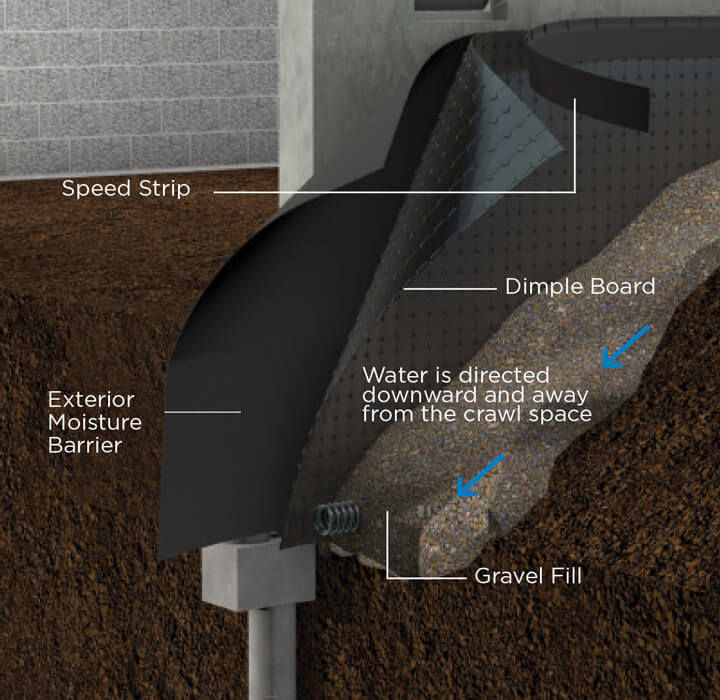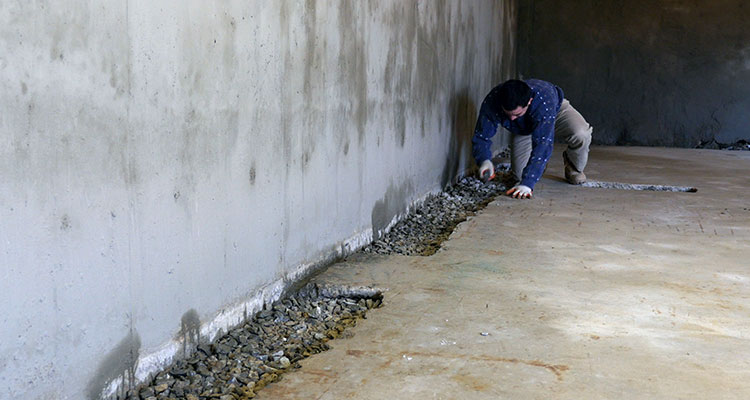Why Sump Pump Installation And Replacement Is Crucial for Flood-Prone Homes
Why Cellar Waterproofing Is Crucial for Securing Your Home From Water Damage
Cellar waterproofing is a vital element of home maintenance that lots of homeowners ignore. It acts as an essential obstacle against wetness that can compromise architectural stability and promote mold and mildew development. Recognizing the threats connected with water damage is the primary step in protecting a house. As water concerns can arise from various resources, identifying the indications early can make a substantial difference in shielding one's financial investment. What alternatives are available for efficient waterproofing?
Comprehending the Threats of Water Damage in Your Basement
Although cellars are frequently used for storage space or added living area, they are specifically prone to water damage because of their location below ground degree. This vulnerability emerges from numerous variables, consisting of dirt saturation, groundwater pressure, and bad drain systems. When heavy rains occur, water can accumulate around the structure, leading to leakages and infiltration. Furthermore, plumbing concerns, such as burst pipelines or overflowing components, can exacerbate the problem.Mold and mildew flourish in moist atmospheres, making basements prime targets for infestation. Prolonged direct exposure to moisture can damage architectural elements, jeopardizing the integrity of the home. Homeowners may also face considerable financial effects due to fixings and possible loss of building value. Recognizing these dangers is important for anyone utilizing their cellar, as proactive measures can aid alleviate the risks postured by water damages and assure a safer living setting.
The Advantages of Basement Waterproofing
Basement waterproofing uses numerous significant advantages for homeowners. It successfully protects against mold development, which can position health and wellness risks and degrade building problems. Furthermore, a waterproof basement can improve air top quality and increase the total worth of the property.
Prevents Mold Growth
Mold and mildew thrives in wet atmospheres, making correct dampness control important for preserving a healthy and balanced home. When cellars are improperly waterproofed, they become prime reproducing premises for mold, which can spread out quickly and jeopardize interior air top quality. Mold and mildew not just postures health and wellness risks, consisting of allergies and respiratory issues, but it can also trigger substantial architectural damage to a home. Reliable cellar waterproofing steps, such as securing cracks and installing water drainage systems, significantly reduce humidity levels and prevent water intrusion. This proactive method lessens the danger of mold growth, securing both the residents' health and wellness and the stability of the home - Basement Waterproofing. By making certain a completely dry basement, property owners can produce a more secure living environment while staying clear of pricey mold and mildew remediation efforts in the future
Increases Residential Property Value
Purchasing basement waterproofing significantly improves a residential property's worth. Buyers progressively prioritize homes with efficient moisture control, acknowledging that waterproofing decreases water-related problems, such as architectural damages and mold development. A completely dry basement not just provides added useful room yet likewise guarantees possible customers of lower upkeep costs in time. On top of that, homes with a history of water damages can prevent purchasers, leading to reduced deals or prolonged listings. By making sure a well-protected basement, homeowners can create a more appealing setting and boost resale capacity. Eventually, the financial benefits of waterproofing extend beyond prompt protection, contributing to long-term asset admiration and an one-upmanship in the housing market. Waterproofing serves as a sensible financial investment for any property owner.
Enhances Air High Quality
A well-kept basement plays a significant duty in a home's total air quality. Waterproofing a basement properly prevents moisture build-up, which is a prime contributor to mold and mold growth. These harmful compounds can bring about respiratory system concerns and other health and wellness worries for residents. By minimizing moisture degrees, cellar waterproofing improves the air high quality throughout the entire home. Additionally, it aids to remove undesirable odors that occur from wet environments. Consequently, home owners can enjoy a much healthier living space, without the risks associated with poor indoor air top quality. Ultimately, buying cellar waterproofing not just secures the structure of the home but additionally guarantees the wellness of its inhabitants.
Usual Sources Of Basement Water Issues
Cellar water concerns commonly occur from a number of common factors. Heavy rainfall can bewilder drain systems, while poor drainage style might stop working to redirect water efficiently. In addition, foundation cracks can enable wetness to leak right into the basement, intensifying the issue.
Hefty Rainfall Influence
When heavy rains occurs, it can greatly worsen existing water issues in homes, particularly in reduced degrees. This influx of water can lead to boosted hydrostatic pressure versus basement walls, forcing dampness via openings and cracks. As the ground fills, water can accumulate around the foundation, creating conditions ripe for seepage. Additionally, the sheer volume of water can bewilder any existing drain systems, resulting in local flooding. Homeowners may notice moisture, mold and mildew growth, and even architectural damage consequently. The effect of hefty rainfall not only highlights vulnerabilities in the home's structure yet likewise stresses the urgent demand for effective basement waterproofing remedies to alleviate these dangers and secure beneficial home from Recommended Reading water damages.
Poor Drainage Solutions
Heavy rains can reveal substantial problems in a home's water drainage systems, which are commonly the undetected offenders behind cellar water concerns. Ineffective gutters and downspouts can fail to straight water away from the foundation, creating overflow and merging near the cellar walls. Blocked drains pipes or misaligned downspouts worsen the situation, as they prevent appropriate water flow. In addition, rating concerns around the property can lead to inappropriate water drainage, routing dampness towards the basement rather of far from it. Improperly developed or inadequate drain systems, such as French drains, might also add to water buildup. Dealing with these drainage issues is necessary to stop water infiltration and secure the stability of the home's structure and foundation.
Structure Cracks Results
Splits in a home's structure can significantly compromise its structural honesty, resulting in different basement water problems. These fissures frequently enable water to leak via, causing wetness and prospective flooding. Basement Waterproofing. Additionally, the presence of water can promote mold and mildew growth, posing health and wellness risks to occupants. Structure cracks can come from different reasons, including dirt negotiation, temperature variations, and incorrect water drainage. Over time, these problems might escalate, triggering additional damages to the structure and surrounding frameworks. Home owners may also face increased fixing prices and decreased home value. Addressing structure fractures without delay via waterproofing and repair services is vital for keeping a safe and dry basement atmosphere, ultimately shielding the home from substantial water damage
Indications Your Basement Demands Waterproofing
A damp or mildewy odor is commonly one of the first signs that a cellar might need waterproofing. House owners need to also be alert for noticeable signs of water damages, such as stained wall surfaces or ceilings, which recommend that moisture is leaking in. Peeling paint or wallpaper might show recurring moisture issues, while mold and mildew or mildew development can pose wellness dangers and signify relentless moisture. Furthermore, pools or damp areas on the cellar floor are clear indicators that water might be infiltrating the space. Home owners must not ignore condensation on wall surfaces or windows, as this can indicate poor air flow and excess wetness. Fractures in the foundation or wall surfaces can further signal a need for waterproofing, as they may permit water access during heavy rains. Identifying these signs early can assist alleviate possible water damage and shield the integrity of the home.

Waterproofing Solutions: What Are Your Options?
Just how can homeowners efficiently secure their cellars from water damages? Several waterproofing options are available to resolve this crucial issue. Interior waterproofing systems include the setup of drainage networks and sump pumps to collect and remove water that leaks in. This technique is often less invasive and can be customized to particular basement layouts.Exterior waterproofing, on the other hand, calls for excavation around the foundation to use waterproof membrane layers and improve water drainage systems. This method is more comprehensive but can be expensive and labor-intensive. In addition, property owners can take into consideration using sealants and layers to protect cellar wall surfaces from moisture penetration. These items create a barrier versus water, although they may not be as effective for extreme water intrusion.Lastly, appropriate grading and downspout extensions can reroute water far from the foundation, additional reducing the danger of cellar flooding. Each option uses one-of-a-kind advantages, allowing homeowners to pick based upon their certain needs and budget.
Preserving a Dry Basement for Long-Term Security
Assuring a completely dry cellar requires continuous Resources maintenance and vigilance from home owners. Routine inspections are important; checking for splits in wall surfaces, wetness accumulation, and indications of mold and mildew can protect against bigger problems. Home owners need to also confirm that rain gutters and downspouts are operating successfully, routing water away from the structure. In addition, keeping correct drain around the residential property is imperative. This might involve landscaping changes or mounting French drains to take care of excess water.Routine sump pump checks are necessary, as these tools play a significant duty in keeping basements dry. Home owners should cleanse the sump pit on a regular basis and check the pump to confirm it operates appropriately. Making use of dehumidifiers can aid regulate humidity levels, especially in wet environments. By dedicating to these positive measures, homeowners can considerably reduce the threat of water damages and protect their investments for the more information long term.
Often Asked Questions
How Much Does Cellar Waterproofing Usually Cost?
Cellar waterproofing prices differ widely, normally ranging from $1,500 to $5,000 depending upon elements like the dimension of the cellar, the kind of waterproofing system, and the level of necessary repairs or modifications. (Sump Pump Installation And Replacement)
Can I Water-proof My Basement Myself?
Numerous homeowners think about DIY basement waterproofing. While it is feasible, they should investigate materials and methods thoroughly. Professional assistance is commonly advised for effective, lasting results, making certain complete security versus prospective water damages.
The Length Of Time Does Waterproofing Last?

The long life of waterproofing can differ significantly, normally lasting in between 5 to one decade. Aspects such as application quality, environmental problems, and upkeep techniques inevitably affect just how successfully the waterproofing continues to be practical gradually.
Will Waterproofing Get Rid Of All Wetness in My Basement?
Waterproofing greatly decreases moisture levels in basements, but it can not entirely eliminate all dampness. Factors such as air flow, drainage, and humidity also affect the total moisture atmosphere, requiring ongoing tracking and upkeep for optimal outcomes.
Are There Any Health Threats From Cellar Water Damages?
Cellar water damage can bring about different health risks, consisting of mold growth, breathing concerns, and allergies. Long term exposure to damp atmospheres may intensify these conditions, positioning significant worries for occupants' overall well-being and security. Basements are frequently used for storage or added living area, they are specifically vulnerable to water damages due to their place below ground degree. Efficient cellar waterproofing steps, such as securing splits and mounting drain systems, greatly reduce moisture degrees and avoid water invasion. Heavy rains can expose substantial flaws in a home's water drainage systems, which are commonly the hidden wrongdoers behind cellar water issues. Exactly how can house owners properly secure their cellars from water damage? These products develop an obstacle against water, although they might not be as effective for severe water intrusion.Lastly, proper grading and downspout expansions can reroute water away from the structure, further reducing the threat of basement flooding.